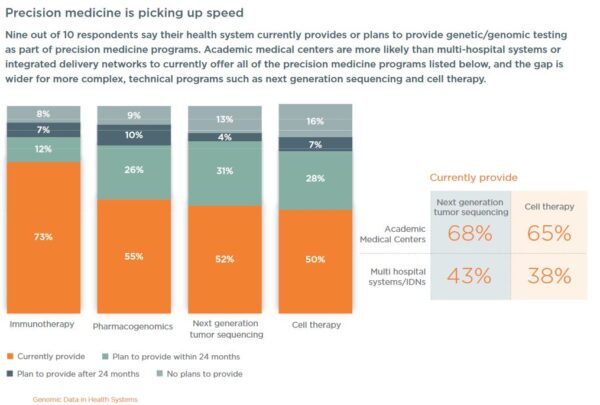
More than 80% of representatives of health systems have instituted genomic data management strategies or plan to do so within the next couple of years, according to a new report.
The report, released Thursday by the University of Pittsburgh Medical Center’s Center for Connected Medicine, surveyed 101 health system and hospital representatives in the U.S. working in roles like information technology, informatics, the business side and in the clinic. The survey was conducted under a partnership with HIMSS Media.
“Among survey respondents, there was a near-unanimous focus on genomic data management, signaling that health systems anticipate growth and increased use of genomics,” said Philip Empey, associate professor at UPMC’s School of Pharmacy, in a statement. “We are pursuing an integrated, enterprise-wide strategy for genomic data management to enable a range of services, both now and in the future, to continue bringing world-class care to our patients.”
The study, according to the authors, highlights the importance of healthcare centers having wide-scale strategies around genomic data, such that they can maximize the value of genetic testing and the data that result from it in precision medicine.
Other findings from the study included that nine out of 10 respondents report their organizations are providing genetic and genomic testing or planning to, with academic medical centers more likely than integrated delivery network or multi-hospital systems to provide such programs. Meanwhile, one-third of surveyed organizations have genomic data management strategies in place, while 64% have them in progress.
The survey also found that the majority of health system executives anticipate that the number of precision medicine vendors their organizations will partner with will grow. Currently, health systems have an average of two or more vendors as it is, in the areas of production of genetic and genomic information, genomic and genetic data storage and analysis. About 60% of respondents said that they anticipate the number of vendors will increase across the board by 2023.
The top three factors considered likely to expand genetic and genomic testing and precision medicine programs are evidence of clinical and cost effectiveness and reimbursement. Executives said they were most commonly getting their information from conferences, industry research and case studies from other health systems.
Photo: UPMC










